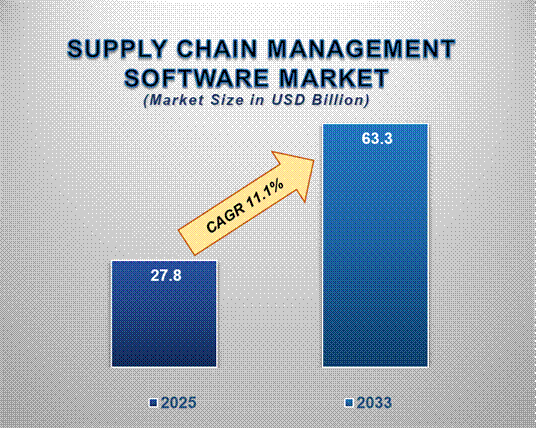
In today’s dynamic global economy, efficient supply chain operations are critical for business success. As companies navigate disruptions, rising costs, and shifting customer expectations, Supply Chain Management (SCM) software has become a cornerstone of digital transformation. From demand forecasting to logistics optimization, SCM platforms enable businesses to manage complexity, reduce risks, and improve visibility.
Request Sample: https://m2squareconsultancy.com/request-sample/supply-chain-management-software-market
The Global Supply Chain Management (SCM) Software Market Size is Expected to witness consistent growth from 2025 to 2033, fueled by rising globalization, the pursuit of greater operational efficiency, and the widespread adoption of cloud-based solutions across various industries. Estimated at around USD 27.3 billion in 2025, the market is projected to grow to USD 62.9 billion by 2033, registering a compound annual growth rate (CAGR) of 10.8% over the forecast period.
Market Overview
Supply Chain Management (SCM) software encompasses a suite of tools designed to manage and optimize the entire supply chain—from procurement and production planning to logistics, warehousing, and last-mile delivery. As global supply chains grow increasingly complex and susceptible to disruptions, organizations are turning to advanced SCM platforms to boost visibility, resilience, and operational agility.
The demand for integrated, cloud-native SCM solutions is being driven by the widespread adoption of digital transformation initiatives and emerging technologies such as artificial intelligence (AI), real-time data analytics, and the Internet of Things (IoT). These innovations enable businesses to make data-driven decisions, forecast demand more accurately, reduce waste, streamline inventory management, and ultimately enhance customer satisfaction.
List of Key Companies
- SAP SE
- Oracle Corporation
- Blue Yonder (JDA Software)
- Manhattan Associates
- Infor
- Kinaxis Inc.
- IBM Corporation
- Epicor Software Corporation
- Coupa Software
- Descartes Systems Group
- E2open
- Dassault Systems
- Logility
- o9 Solutions
- Other Emerging Players
Key Drivers of Market Growth
1. Digital Transformation & Industry 4.0
Manufacturers and retailers are adopting SCM tools that integrate IoT, AI, and cloud computing to automate workflows and enhance data-driven decision-making.
2. Global Supply Chain Disruptions
Events like the COVID-19 pandemic and global conflicts have exposed vulnerabilities in traditional supply chains. Businesses are investing in SCM software to build resilience and mitigate risks.
3. E-commerce & Omnichannel Logistics
The explosion of e-commerce has increased the demand for agile, responsive, and integrated supply chain systems that can handle multi-channel operations and same-day delivery.
4. Cloud-Based Deployment Models
The shift from legacy on-premise systems to cloud-based SCM platforms offers scalability, cost savings, and real-time collaboration across geographies.
Buy Now Report: https://m2squareconsultancy.com/purchase/187
Regional Market Insights
- North America: Leads the market due to early tech adoption and demand for advanced analytics.
- Europe: Strong emphasis on sustainability and supply chain compliance.
- Asia-Pacific: Fastest-growing region, driven by manufacturing hubs in China, India, and Southeast Asia.
- Middle East & Africa: Rising interest in logistics automation and infrastructure development.
Challenges in the SCM Software Market
- High Initial Costs: Especially for SMEs transitioning from manual to digital systems.
- Integration Complexity: Legacy systems can be difficult to integrate with modern SCM platforms.
- Data Security Concerns: Especially with cloud-based and AI-driven platforms handling sensitive trade data.
- Skilled Workforce Shortage: Demand exceeds supply for professionals who can manage and interpret SCM data.
Future Outlook: Where Is the SCM Software Market Heading?
The future of the SCM software market is intelligent, agile, and highly automated. Emerging trends include:
- AI & Predictive Analytics: Forecasting demand, managing disruptions, and automating replenishment.
- Blockchain Integration: Enhancing transparency and traceability in supply chains.
- Sustainability Tools: Managing carbon footprints, optimizing routes, and complying with ESG standards.
- Edge Computing & IoT: Real-time tracking of goods and equipment.
Competitive Analysis
The global Supply Chain Management (SCM) software market is experiencing dynamic competition, driven by technological advancements and strategic initiatives. SAP and Oracle lead with integrated AI-powered platforms, enhancing automation and resilience. Microsoft’s Dynamics 365 and Coupa’s Community.ai leverage community-driven insights and generative AI for real-time decision-making. Blue Yonder, under Panasonic, offers AI-enhanced demand and supply planning, while Manhattan Associates focuses on cloud-native warehouse and transportation solutions. Emerging players like Project44 and Altana address tariff complexities with advanced logistics tools. The market is characterized by consolidation, with scale and data integration becoming pivotal competitive factors.
Related Reports:
Email: sales@m2squareconsultancy.com
Phone (IN): +91 80978 74280
Phone (US): +1 929 447 0100


